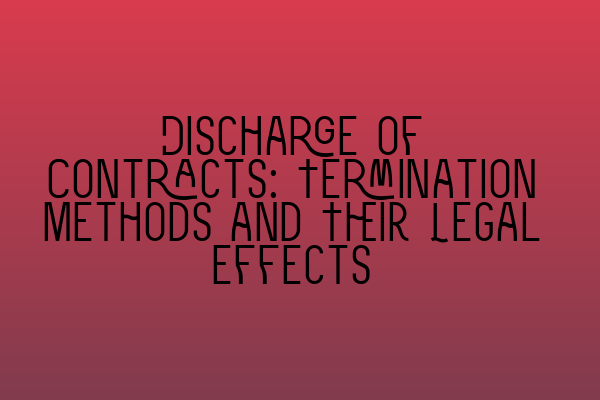Discharge of Contracts: Termination Methods and Their Legal Effects
In the realm of contract law, the discharge of a contract refers to the termination or release of the contractual obligations between parties. This pivotal moment marks the end of the contractual relationship and carries with it significant legal consequences for both parties involved. Understanding the various methods of contract discharge and their legal effects is crucial for any individual or business engaged in contractual agreements.
1. Performance
The most straightforward and common method of contract discharge is performance, where both parties fulfill their respective obligations as outlined in the contract. When all terms and conditions are met to the satisfaction of both parties, the contract is considered discharged, and the parties are free from any further obligations.
However, it is important to note that partial performance may also be deemed sufficient, as long as both parties agree to accept it as such. In such cases, the outstanding obligations are typically renegotiated or adjusted to reflect the partially fulfilled terms.
For further examples and in-depth knowledge about SQE 1 exam questions, SQE 1 Practice Exam Questions.
2. Agreement
In certain situations, parties may mutually agree to terminate a contract through agreement, even if the original contractual obligations have not been fully performed. This method is known as a mutual agreement to rescind or terminate the contract.
However, it is important to ensure that the agreement to terminate a contract is properly documented and clearly expresses the intentions of both parties. Without a clearly worded agreement, there is a risk of potential disputes or claims arising in the future.
To gain comprehensive knowledge about practice mocks for SQE 1 FLK1 and FLK2, refer to SQE 1 Practice Mocks FLK1 FLK2.
3. Frustration
In certain circumstances, a contract may be discharged due to the doctrine of frustration. Frustration occurs when unforeseen events make it impossible for the parties to fulfill their contractual obligations. These events are typically beyond the control of either party and are not due to any fault or neglect.
Examples of events that may invoke the doctrine of frustration include war, natural disasters, or the inability to perform due to a change in law. When a contract is discharged due to frustration, both parties are typically released from any further obligations, and any money or benefits already exchanged are returned.
If you are looking for SQE 2 preparation courses, check out our comprehensive program at SQE 2 Preparation Courses.
4. Breach
When one party fails to fulfill their obligations under a contract, it constitutes a breach of contract. A breach can occur in various ways, including non-performance, defective performance, or anticipatory breach (where one party indicates they will not fulfill their obligations).
When a breach occurs, the innocent party has a right to terminate the contract and seek damages for any losses suffered as a result. The innocent party may also have the option to continue with the contract and seek specific performance or negotiate an alternative remedy.
To learn more about SQE 1 preparation courses, visit SQE 1 Preparation Courses.
5. Operation of Law
In some cases, a contract may be discharged by operation of law. This occurs when external factors, such as a change in legislation or bankruptcy, render the contract unenforceable or impossible to perform.
For example, if new laws are introduced that make the contract illegal or impractical, the contract may be discharged by operation of law. Similarly, if one party becomes bankrupt, it may result in the automatic discharge of any contracts they are a party to.
For information regarding SRA SQE exam dates, refer to SRA SQE Exam Dates.
Conclusion
Understanding the various methods of contract discharge and their legal effects is essential for anyone involved in contractual agreements. Whether through performance, mutual agreement, frustration, breach, or operation of law, the discharge of a contract marks the end of the contractual relationship and triggers specific legal consequences.
For further resources and study materials, be sure to check out our SQE 1 exam questions, practice mocks, and preparation courses. With comprehensive knowledge and preparation, you can navigate the complexities of contract law and ensure your contractual agreements are effectively discharged.
